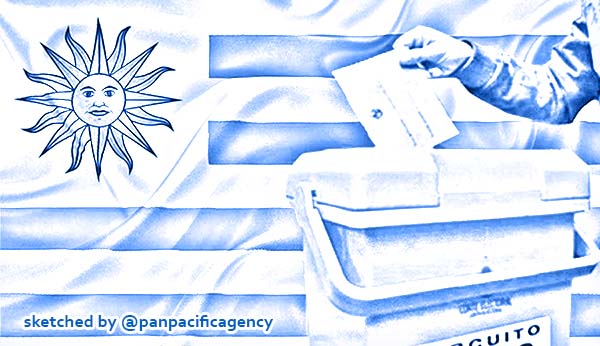2,3 million electors will be voting for local authorities during pandemic in Uruguay

Uruguay has an impeccable record in containing the virus, but this Sunday 2,3 million Uruguayans will mobilize to comply with the mandatory voting. Photo: Merco Press. Sketched by the Pan Pacific Agency.
MONTEVIDEO, Sep 27, 2020, Merco Press. Uruguayans love to vote and trust the certainty and guarantees of their electoral system. It’s part of the Uruguayan ingrained political culture and helps explain the stability of the South American country, Merco Press reported.
This Sunday Uruguayans are again going to the polls to elect the mayors of the 19 counties which make up the political division of the country plus the spokespersons at municipal level of several small towns.
No major political surprises are expected and the election takes place with a delay of several months, because May was only a few weeks away, when the Covid 19 pandemic reached the county. But September finds the world in the midst of a second wave of the virus and the region is full of failed attempts to contain it, while Uruguay outstands globally as an example of perseverance and transparency, with some of the lowest contagion and death rates worldwide.
Thus Sunday has become a major sanitary challenge, since in Uruguay voting even at local level is mandatory, and this means some 2,5 million electors out of a population of 3,6 million will have to attend personally to their circuits to comply with law and responsibility. Uruguay does not have a postal vote and does not accept a system of overseas voting.
The latest report from Uruguayan health officials indicates that the country has had almost 2,000 cases that tested positive to Covid19, since the outbreak of the pandemic on 13 March, of which 1,726 have recovered, which means 235 remain under medical attention. Only two of them are currently in need of ICU, and the total death toll is 47. Likewise 228,335 swab tests have been done and there is a strong campaign to respect sanitary measures.
Not a bad record living next to Argentina and Brazil which keep breaking records of virus contagion and deaths, with repeated months-long mandatory lockdowns. There have been no lockdowns in Uruguay, only an appeal to respect sanitary protocols and defend freedom by acting responsibly.
Based on this concept the Electoral Court has decreed very strict measures on voting day Sunday to minimize the risks of the virus contagion. To start with every voter must have a face mask and if not a disposable one will be supplied at the ballot station.
A two meters distance in the queue to vote is also mandatory and electors are advised to attend on their own with no companions. It is common for Uruguayans to attend with family members since Election day is considered a very special occasion and a non working holiday. The Electoral Court also calls on electors to be aware through the media about possible agglomerations.
Each polling circuit will have a cleaning kit with soap, detergent, gel alcohol, disposable napkins, face masks and gloves.
At the moment of voting, electors are invited to exhibit their electoral credential or deposit it on the table in such a manner that circuit members do not have to touch it. No tongue licking or saliva to close the envelope with the paper ballot, which is then introduced to the ballot box. Circuit staff must use gloves at all times.
Additionally the Home Secretary had called on voters to return home after complying with their civic duties, and “please no celebrations of any kind”, winners or losers, which can bring people together”
It is understood that as part of the sanitary protocol, some results will be announced on Monday to avoid celebrations and/or demonstrations since Uruguayans love to celebrate electoral victories.
As to the election itself, the opposition coalition is expected to win in Montevideo, the capital, and Canelones, a surrounding county which is part of the metropolitan area. In the rest of the counties, the ruling coalition which took office last March, it is expected to retain 12, a minority member of the coalition one, while three currently under the opposition, could change hands.
In vote numbers it is significant since the opposition with Montevideo, Canelones and a small county confirms control of almost half the electorate, while the ruling coalition retains its minimum majority difference.
The so called progressive catch all opposition grouping, which ruled the country during the last fifteen years and 35 the city of Montevideo, has a solid rock 48/55% vote support in the capital while the current middle of the road coalition garners between 35% and 40%. It is also interesting to note that the generation which led the Broad Front for decades is fading, mainly Tabare Vazquez, Danilo Astori and Jose Mujica, and a new set of leaders can be expected, but of the three hopefuls running for the government o Montevideo, there is none of the usual enthusiasm.
But the main question on Sunday is whether Uruguay can keep standing its enviable record in containing the coronavirus.